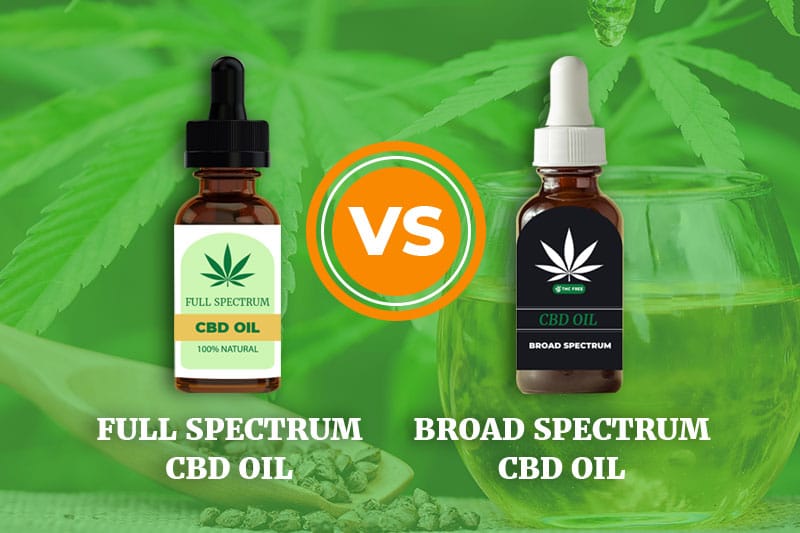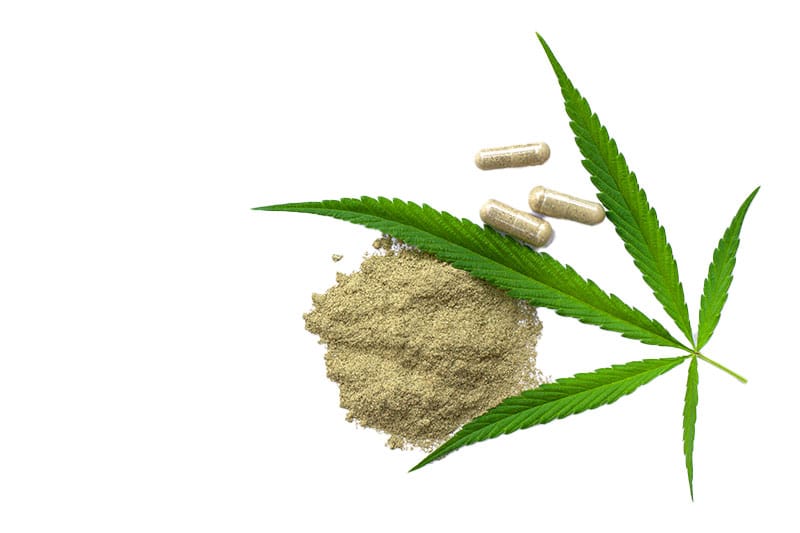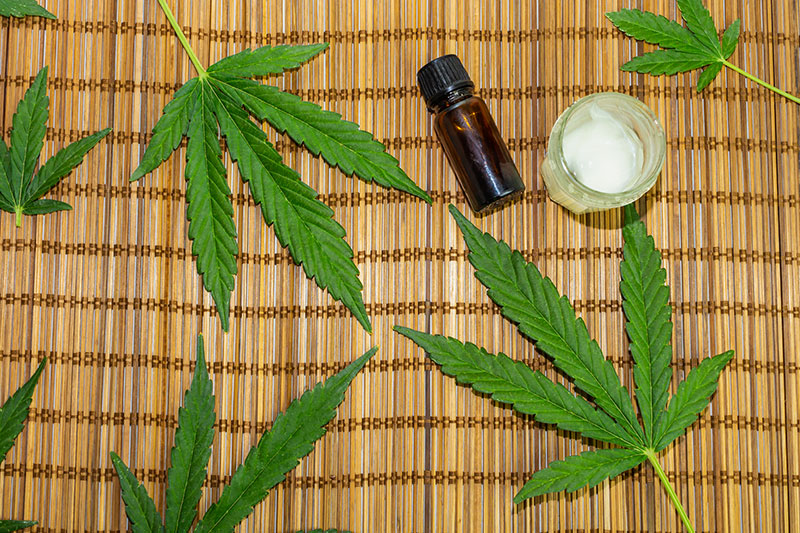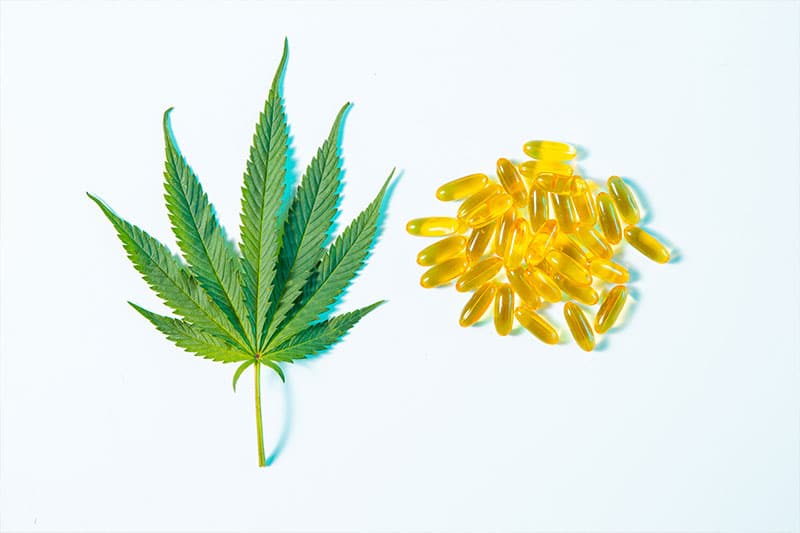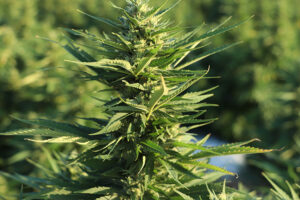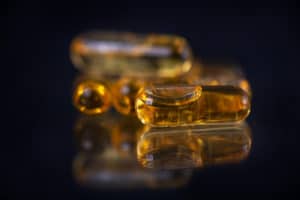If you are having trouble figuring out if you should be spending your money on full-spectrum or broad-spectrum oil, that’s understandable. Their names (full and broad) sound similar, but they have some important differences.
The biggest differences between the two are their composition and how they interact with the human body. In this full-spectrum vs broad-spectrum CBD oil comparison, we’ll look at what makes each one unique and their potential benefits.
By the end of this post, you should have a clear idea of the differences between the two and have no trouble figuring out which CBD oil is right for you.
Let’s start by taking a look at what full- and broad-spectrum CBD oils are.
What is full-spectrum CBD oil?
Full-spectrum, or whole-plant, CBD oil contains all of the cannabis compounds that you’d get from consuming a whole cannabis plant. That means it contains all of the good stuff that you want, and some that you might not want, such as the psychoactive compounds.
Since it contains all of the compounds that are traditionally found in cannabis, including cannabidiol (CBD), tetrahydrocannabinol (THC), cannabinol (CBN), terpenes, and more, you can experience the physiological benefits of the entourage effect.
According to studies, the entourage effect means that CBD oil is more potent when all the cannabis compounds are present because they all work together to deliver optimal results (more on this later). That makes it a great choice for CBD users with severe symptoms that CBD isolate or broad-spectrum products can’t treat.
To make things even clearer, here are some pros and cons of full-spectrum CBD oil.
Pros
- Contains various cannabinoids, terpenes, and flavonoids that deliver wider health benefits
- Users can benefit from the entourage effect
Cons
- May contain impurities since it is the least processed form of CBD
- Typically has a strong earthy smell and taste that most consumers don’t enjoy
- May show up on a drug screening due to its THC content
- Traveling across state lines can cause problems in states with harsh THC laws
What is broad-spectrum CBD oil?
Unlike full-spectrum CBD oil, broad-spectrum CBD undergoes more thorough processing that removes additional compounds from the oil. For example, broad-spectrum CBD oil rarely contains any THC due to its more refined state, but it still contains other cannabinoids, allowing for some degree of the entourage effect.
The absence of THC in broad-spectrum products makes it ideal for people who live in states where THC is illegal. It’s also a great choice if you need to pass a drug test but still want to use CBD.
On the downside, in addition to removing THC, the refining process also removes some beneficial cannabinoids. Because not all of the cannabinoids in a whole cannabis plant are present in broad-spectrum CBD oil, its entourage effect is less potent.
Pros
- It contains minimal impurities but many useful cannabinoids
- No risk of psychoactive effects due to its lower THC content
- Less potent hemp flavor and smell
Cons
- Not as widely available as full-spectrum CBD oil
- Minimal entourage effect
Is CBD isolate the same as full- or broad-spectrum CBD oil?
We can’t look into the full-spectrum vs broad-spectrum CBD oil debate without mentioning CBD isolate.
CBD isolate is even more heavily refined than broad-spectrum CBD. It is so heavily refined that the only evident cannabis compound in it is CBD. It is not uncommon to find CBD isolate products with more than 90 percent CBD content and negligible amounts of other cannabinoids.
It is ideal for CBD users who are interested in the potential health benefits of the CBD compound and nothing else, especially those who are sensitive to other cannabinoids.
CBD isolate has zero entourage effect due to the presence of only CBD in the product, which overall, makes it less potent than full- or broad-spectrum CBD. But if all you need is the CBD cannabinoid, then CBD isolate is good enough for you.
Pros
- A highly concentrated form of CBD that requires smaller dosesfor the desired effect
- None of the risks that come with using products that contain THC
- Has no flavor or smell, meaning you can add it to drinks and food
- Safe for everyone
Cons
No entourage effect
Why are there so many CBD products?
Having options is good, but it can also be confusing. With so many CBD oil variations available, many people struggle with figuring out which product to choose.
On the upside, with so many CBD oil variations, you can pick one that’s tailored to suit your unique needs.
The reason why there are so many CBD products is the extraction process. The extraction process that turns a cannabis or hemp plant into CBD oil determines what cannabinoids are left in the product.
Previously, you could only get full-spectrum CBD oil due to the limitations of the extraction processes that were available at the time. Now, we have more advanced extraction processes that can take out specific cannabinoids and leave in the desired ones. Read on to find out more about the CBD extraction process.
Full-spectrum CBD Oil – is it for me? Best Full-spectrum CBD Oil products
With a combination of compounds such as terpenes flavonoids for greater effectiveness, there are numerous benefits associated with using full-spectrum CBD oil.
Treatment of chronic pain and inflammation is probably one of the common uses of CBD Oil. Due to its pain-relieving and anti-inflammatory properties, full-spectrum CBD oil is your best bet in this regard, especially if you do not have access to medical marijuana.
Types of chronic pain include:
- headaches and migraines
- back pain
- cancer pain
- post-surgical pain
- inflammatory pain
Moreover, full-spectrum CBD oil, with its entourage effect for greater effectiveness, can help alleviate anxiety and provide a calm state of mind. If you have trouble with clammy hands and interacting with new people in social gatherings, then this might be the product for you. Plus, with a trace-quantity of THC, there is a possibility you can experience slight psychoactive effects as well if that is your cup of tea.
Even though the legalization of CBD products is gaining momentum, you should check the legal status of cannabis in your country before opting for full-spectrum CBD oil. Nevertheless, here are some of the full-spectrum CBD oil available in the market:
Ananda Hemp Full Spectrum CBD Oil
- Made and grown in the USA
- Available in 3 different strengths
- Premium, quality-tested, hemp-derived oil
CBDistillery Full Spectrum tincture oil
- Less than 0.3 percent THC
- Third-party lab tested
- Fractionated coconut oil as the carrier
Best Life Hemp Full Spectrum Hemp Extract CBD Oil
- 8mg CBD per ml, solvent-free, hemp extract
- Licensed US hemp agencies
- Affordable prices
How can I benefit from Broad-spectrum CBD Oil? Top brands offering broad-spectrum CBD Oil
As mentioned before, broad-spectrum CBD oil has a similar extraction method as full-spectrum CBD oil. However, its flexibility in optimizing the cannabinoid ratio you need is what makes it unique.
Not everyone is looking to get high when trying out cannabis products, and broad-spectrum CBD oil makes the difference. If you are looking to avoid THC altogether and not fail that drug test your boss has recommended, go for broad-spectrum CBD oil. Choosing this variant will not deprive you of all the added health benefits associated with full-spectrum CBD oil.
Some of Broad-spectrum CBD oils for you to choose from:
Ananda Hemp Broad-spectrum, THC-free extract
- Made and Grown in the USA
- MCT oil used as the carrier
- Quality Tested
CBDistillery Broad-spectrum CBD Oil tincture
- Easy administration
- Perfect for everyday use
- Non-detectable levels of THC
- Available 4 different flavors including mint, orange, and berry
- Free shipping in the USA
- Vegan, gluten-free products
The goodness of pure, isolate CBD – Best CBD Isolate products.
This refined, highly potent variant of CBD oil is perfect for people who are not fond of tasting the natural flavor of hemp. With a high concentration of CBD and the absence of other plant compounds, you are looking at increased effectiveness and quicker results. CBD isolate oils are quite versatile as you can use them as a base for other CBD products, including vape juices, beauty products, and edibles. You can also add them to your favorite food and drinks without altering their flavor.
Here are someCBD Isolate products you can choose from:
CBDistillery 1000mg CBD Isolate Oil
- Pure CBD (almost 99%), no added compounds
- MCT carrier oil
- Third-party lab tested
- High-potency, pure CBD oil
- Available in 3 different strengths
- Easy-to-use
CBD oil extraction process
When you compare how full-spectrum vs broad-spectrum CBD oil are made, they both start as a cannabis plant but become something else due to different extraction processes.
The initial stages of the extraction process are the same for all forms of CBD oil. The first step is to apply pressure to the cannabis plant to crush out the oil. CBD oil manufacturers that prioritize quality typically use pressurized carbon dioxide or food-grade ethanol to apply the pressure.
While applying the pressure, hairs on the plant will pop open to release the cannabinoids within. The cannabinoid compounds will bind to the carbon dioxide or ethanol. Then, the mixture will be distilled to filter out the solid plant material.
The final step is refining the formula to create either full-spectrum or broad-spectrum CBD oil. Refining involves removing the carbon dioxide or ethanol from the mix and leaving behind the desired cannabinoids and other compounds.
For full-spectrum CBD, the present cannabinoid compounds are similar to what was in the cannabis plant the oil was extracted from. But with broad-spectrum CBD, mostly the CBD compound, and a few other compounds, are left behind.
What is the entourage effect?
The name, entourage effect, gives a pretty good idea of what it means. When a person operates with an entourage, he or she tends to be more visible and efficient.
The same thing goes with cannabinoid compounds. Each compound offers a unique health benefit, but the health benefit of each one is more pronounced when the other compounds are present. That’s because certain cannabinoid compounds amplify the effects of others. Even better, certain cannabinoids minimize the potential side effects of other cannabinoids.
Aside from THC and CBD, other prominent cannabinoids in whole-plant hemp products that work together to create the entourage effect include:
- Cannabinol (CBN)
- Cannabichromene (CBC)
- Cannabigerol (CBG)
- Cannabidiol acid (CBDA)
- Cannabidivarin (CBDV)
Like CBD, CBG, CBC, and CBN are non-psychoactive compounds, meaning none of them can get you high. But they do have other benefits. For instance, studies show that CBG can help ease anxiety, pain, muscle cramps, and depression.
CBC has an anti-inflammatory and anti-cancer effect. It’s also effective for pain relief and works as an anti-viral and antimicrobial. Studies are still ongoing on CBN, but current evidence indicates that it has sedative effects, which make it suitable for assisting with sleep issues and treating anxiety.
Aside from the above compounds, CBD also contains terpenes. Terpenes are chemicals in hemp that give it its unique scent. But aside from giving CBD its scent, terpenes also have health benefits, such as aiding healing and sleep.
There are over 200 terpenes in cannabis and each one has its unique potential health benefits, which are still being studied. All of these compounds, as well as others that we haven’t mentioned, work together to create the entourage effect and deliver wholesome physiological benefits.
But if making broad-spectrum CBD oil requires removing some of its scent and taste, then clearly a lot of its terpenes are taken out during the refining process.
It’s not just terpenes that are lost when refining broad-spectrum CBD, but also several cannabinoids. It’s even more so for CBD isolate products. When these essential CBD compounds are missing, the entourage effect cannot occur. If you want to maximize the entourage effect, full-spectrum CBD is your best bet.
The results of a 2015 study by the Lautenberg Center for General Tumor Immunology showed that using full-spectrum CBD for pain relief was more effective than using CBD isolate. Also, the higher the dose of full-spectrum CBD, the higher its pain relief effect. With CBD isolate, the effect remained the same regardless of an increase in the dose.
Full-spectrum vs broad-spectrum CBD oil: Which is better?
Saying that full-spectrum CBD is better than broad-spectrum CBD, or vice versa, is misleading. Each product is ideal to fulfill a specific purpose.
For instance, do you want the effects of CBD without the effects of THC? If so, broad-spectrum is a better choice. But if you want the full entourage effect and don’t mind consuming small amounts of THC, full-spectrum CBD wins.
In short, since everyone has different needs and reacts differently to CBD, the best choice will vary from person to person.
Another issue is if you are already on medication, some of the compounds in full-spectrum or broad-spectrum CBD may interact poorly with your medication. In this case, ask your doctor if it’s safer to use full-spectrum or broad-spectrum CBD or avoid both. You could also consider using a CBD isolate product.
Hemp and Marijuana-derived CBD products – Does it matter?
Many individuals exploring CBD products for the first time usually do not have any clue about how the origin of their CBD product can affect their experience. Hemp and marijuana belong to the same species of plants called Cannabis sativa. Hemp plants are generally tall and sturdy, requiring cultivation outdoors. Marijuana plants are smaller in size and with more flowers/buds per stalk.
Marijuana plants can have significantly higher levels of THC (more than 30% per dry weight) as compared to hemp plants that have trace-quantity of THC (less than 0.3%). CBD oil derived from marijuana can get you high, but the effect will not be that intense. The psychoactive properties of marijuana-derived products are not consistent with CBD oil extracted from hemp.
Which should you choose?
There are many factors – for instance, the cannabis laws in your state, your physiology, and what you hope to gain by using CBD – to take into consideration when trying to decide the ideal type of CBD oil for your needs.
If the laws in your state frown on the use of THC, using a CBD oil that contains above 0.3 percent THC could get you in trouble. The problem is, some manufacturers claim that their CBD oil has less than 0.3 percent THC when that may not be true.
To minimize the risk of getting into trouble with THC, you are better off sticking with a broad-spectrum CBD oil. But if THC isn’t a legal issue in your state and you don’t intend on traveling to a state with harsh THC laws, then full-spectrum CBD is an option.
There’s also the issue of taste. Full-spectrum CBD oil has a very earthy taste and smell because it goes through less refinement. Broad-spectrum also has an earthy aroma and flavor, but it’s less pronounced because the oil goes through a more thorough refining process. If you are not a fan of the earthy flavor of cannabis, broad-spectrum CBD might be a better choice.
But keep in mind that the taste, composition, and efficacy of CBD oil are influenced not only by the refining process but also by the brand. For instance, some companies extract their full-spectrum CBD oil from marijuana plants, while others use strictly hemp plants.
Hemp plants contain minimal THC, while marijuana plants are rich in THC. If you are avoiding THC, a full-spectrum CBD oil that’s derived from a marijuana plant will likely have more THC than you want.
To ensure that you are getting a good quality broad- or full-spectrum CBD oil, get your product from a reputable company. Such a company will be transparent regarding the contents of its CBD oil and whether the oil comes from a marijuana or hemp plant.
When you know exactly what’s in a batch of CBD oil, you are less likely to encounter compounds or ingredients that you’d rather avoid.
Still wondering whether to choose broad- or full-spectrum CBD oil? We recommend trying both full- and broad-spectrum CBD from top-notch brands. This approach will give you a firsthand idea of which works best for you and satisfies your needs the most.
FAQs About The Differences of Full Spectrum vs Broad Spectrum CBD Oil
Question: Which is better between full-spectrum and broad-spectrum CBD oil?
Answer: Each product is ideal to fulfill a specific purpose. Do you want the effects of CBD without the effects of THC? If so, broad-spectrum is a better choice. But if you want the full entourage effect and don’t mind consuming small amounts of THC, full-spectrum CBD wins.
Question: What is a full-spectrum CBD oil?
Answer: Full-spectrum, or whole-plant, CBD oil contains all of the cannabis compounds that you’d get from consuming a whole cannabis plant. That means it contains all of the good stuff that you want, and some that you might not want, such as the psychoactive compounds.
Question: What is broad-spectrum CBD oil?
Answer: Broad-spectrum CBD undergoes more thorough processing that removes additional compounds from the oil. For example, broad-spectrum CBD oil rarely contains any THC due to its more refined state, but it still contains other cannabinoids, allowing for some degree of the entourage effect.
Question: Why are there so many CBD products?
Answer: The reason why there are so many CBD products is the extraction process. The extraction process that turns a cannabis or hemp plant into CBD oil determines what cannabinoids are left in the product.
Question: What is CBD entourage effect?
Answer: The name, entourage effect, gives a pretty good idea of what it means. When a person operates with an entourage, he or she tends to be more visible and efficient.
Question: Does it matter if the CBD product is derived from Marijuana?
Answer: Marijuana plants have significantly higher levels of THC compared to hemp plants. CBD oil derived from marijuana can get you high while CBD oil extracted from hemp won’t likely have psychoactive effects.
Feel free to steal this image for your own site. All we ask is for proper attribution.
